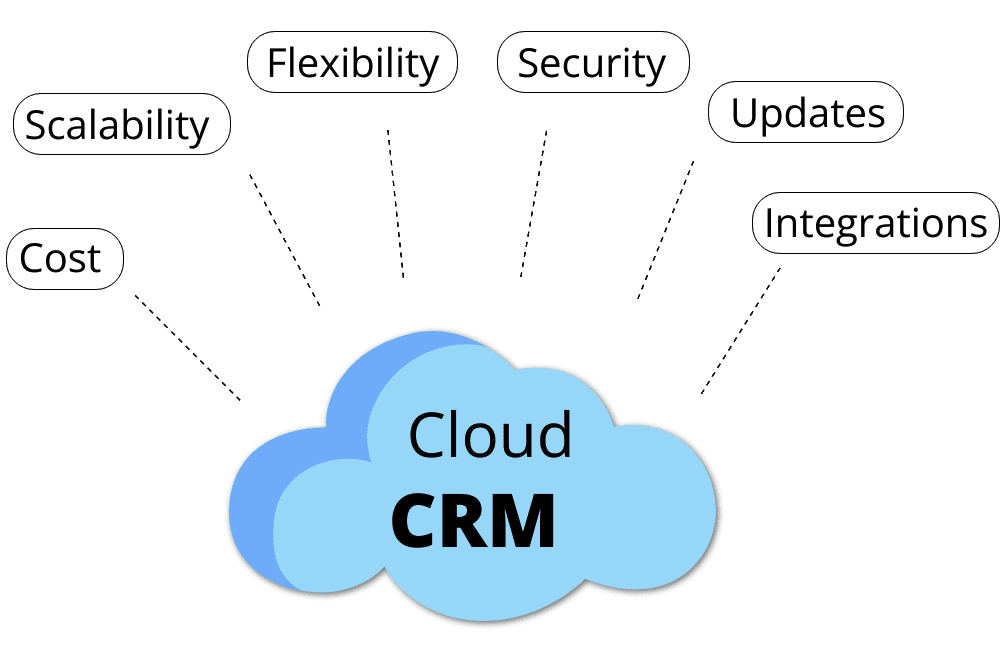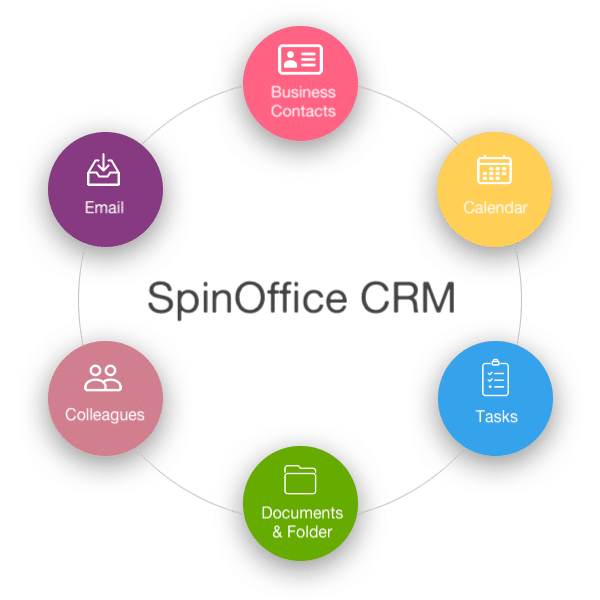How to choose the right cloud-hosted CRM for your business: the Pros and Cons
The cloud has become increasingly popular in recent years, and for good reason. Cloud-based solutions offer a number of advantages over traditional on-premises software, including increased flexibility, scalability, and lower costs.
One type of cloud-based solution that has seen growing adoption in recent years is cloud-hosted CRM (customer relationship management) software. CRM software helps businesses manage their customer data and interactions, and can be a valuable tool for sales, marketing, and customer service teams.
However, not all CRM solutions are created equal. There are a variety of different types of cloud-hosted CRMs available, each with its own set of pros and cons. So how do you choose the right one for your business?
In this article, we’ll take a look at understanding cloud-hosted CRM solutions, the different types of CRMs available, and the pros and cons of each. We’ll also provide some tips on how to choose the right CRM solution for your business needs.
Understanding cloud-hosted CRM solutions: what they are, how they work and benefits
A cloud-hosted CRM solution is a software application that helps businesses manage their customer relationships. It can be used to track customer data, sales, and marketing activities. Cloud-hosted CRMs are typically accessed via the internet, making them convenient to use and easy to scale.
There are many benefits of using a cloud-hosted CRM solution. First, it can help businesses save money on upfront costs since there is no need to purchase and install software. Second, cloud-hosted CRMs are easy to use and require little training. Third, they offer flexibility and scalability, allowing businesses to add or remove users as needed. Fourth, they provide real-time data access, so businesses can always have the most up-to-date information about their customers. Finally, cloud-hosted CRMs offer robust security features to protect customer data.
How cloud-hosted CRMs work and their benefits
Cloud-hosted CRMs work by storing customer data in the cloud—a network of remote servers that are accessed over the internet. This type of storage offers several advantages over traditional on-premises storage methods. First, it eliminates the need for businesses to purchase and maintain their own servers. Second, it provides anywhere, anytime access to customer data—all you need is an internet connection. Third, it offers increased scalability and flexibility, allowing businesses to add or remove users as needed without having to make changes to their infrastructure. Finally, cloud storage is more secure than on-premises storage methods because companies that provide cloud services invest heavily in security measures such as encryption and firewalls.
Different types of cloud-hosted CRMs
An on-premises CRM solution is a cloud-based system that is installed and operated from within your company’s own premises. This type of CRM offers the most control over data and customizations, but it can be more expensive and require more IT resources to maintain.
SaaS CRM solution
A SaaS (software as a service) CRM is a cloud-based system that is accessed and managed via the internet. This type of CRM is typically less expensive than an on-premises system, and requires less maintenance and IT resources. However, you may have less control over data and customizations with a SaaS solution.
Private cloud CRM solution
A private cloud CRM is a cloud-based system that is hosted on a private network, usually within your company’s premises. This type of CRM offers the same benefits as a public cloud solution, but with the added security and control of a private network.
Public cloud CRM solution
A public cloud CRM is a cloud-based system that is hosted on a shared network by the provider. This type of CRM is typically the most affordable option, but you may have less control over data and customizations than with other types of solutions.
Pros and Cons of cloud-hosted CRM solutions
CRM system is one of the most popular systems to help organizations manage and increase business growth and better manage their front-end activities as companies usually invest in CRM technology within the first 5 years. According to IBM studies, 91% of companies with 10 or more employees use a CRM, of which 87% of companies used a cloud CRM.
Unlike in ERP (enterprise resource planning) systems, where on-premises versions are still very popular and implemented by many companies small and large, cloud CRM software is often the preferred choice.
So here, we will discuss six benefits of the cloud CRM system and why it could be your first choice when you want to implement a CRM system.

The advantages of using a cloud-hosted CRM solution:
1. Cost: One of the biggest advantages of using a cloud-hosted CRM is the cost savings. With this type of solution, you don’t have to invest in costly hardware or software licenses. Instead, you pay a monthly subscription fee, which can be a fraction of the cost of traditional on-premises solutions.
2. Scalability: Another big advantage of cloud-hosted CRMs is scalability. With an on-premises solution, you’re limited by the capacity of your server. If you need to add more users or increase storage, you have to purchase and install additional hardware. With a cloud-hosted solution, you can simply add more users or increase storage as needed, without having to make any capital investments.
3. Flexibility: Cloud-hosted CRMs are also very flexible, since they can be accessed from anywhere there’s an internet connection. This means that employees can access customer data from their laptops, smartphones, or tablets while they’re on the go. And since there’s no need to install any software, employees can start using the system immediately, without any training required.
4. Security: Although some businesses are concerned about security when it comes to storing data in the cloud, most reputable providers offer robust security features, such as data encryption and user authentication. In fact, your data is often more secure in the cloud than it is on your own premises since providers typically have stricter security measures in place than most businesses do.
5. Updates: Cloud providers typically handle software upgrades, ensuring that customers are always using the latest version.
6. Integration: Cloud-hosted CRM solutions can easily integrate with other business systems and applications, streamlining processes and improving efficiency.
3 Disadvantages of cloud-hosted CRMs
There are a few potential disadvantages to using a cloud-hosted CRM solution:
1. Internet dependency: One of the biggest potential disadvantages of using a cloud-hosted CRM is that it requires an internet connection to work. This means that if your internet connection goes down, you won’t be able to access your customer data. While this isn’t a major concern for most businesses, it’s something to keep in mind if you have a less than reliable internet connection.
2. Limited customization: Another potential downside of cloud-hosted CRMs is that they can be difficult to customize. Since they’re hosted by the provider, you generally don’t have access to the underlying code, which makes it difficult to make changes or add custom features. If you need a highly customized solution, an on-premises CRM may be a better option.
3. Vendor Lock-in: Finally, there’s the issue of vendor lock-in with cloud-hosted CRMs. Since your data is stored with the provider, you may be reluctant to switch providers if you’re not happy with the service or if you find a better deal elsewhere. To avoid this problem, be sure to read the fine print before signing up for any service and look for providers that offer flexible cancellation policies.
How to choose the right cloud-hosted CRM
The first step in choosing the right cloud-hosted CRM is to identify your business needs. What are your goals for using a CRM? What features and functionality are you looking for? Make a list of must-have features and nice-to-have features. Once you know what you need, you can start researching your options.
Research your options
There are many different cloud-hosted CRMs on the market, so it’s important to do your research and compare your options. Read online reviews, talk to other businesses that use CRMs, and get expert advice to help you narrow down your choices.
Compare pricing and features
Once you’ve narrowed down your choices, it’s time to compare pricing and features. Make sure to compare apples to apples—look at the features that are important to you and make sure they’re included in the price quotes you’re getting. Also, be sure to ask about any hidden costs or fees that might be associated with the CRMs you’re considering.
Get expert advice
Finally, once you’ve done your research and compared your options, it’s a good idea to get expert advice before making a decision. A consultant or analyst who specializes in CRM can help you understand the pros and cons of each option and make sure you choose the right CRM for your business needs.
To help you choose the most suitable CRM supplier for your organization, we have listed a few steps for you. Follow these six essential steps mentioned in the article How do you choose the right CRM solution?
Conclusion
If you’re considering a cloud-hosted CRM solution for your business, it’s important to weigh the pros and cons carefully. On the plus side, cloud-hosted CRMs offer flexibility, scalability and lower upfront costs. However, there are also some potential downsides to consider, such as security risks and data loss. The best way to choose the right cloud-hosted CRM for your business is to identify your needs, research your options and get expert advice.
Try SpinOffice CRM
Have you got a good idea of what a cloud-hosted CRM entails and are you ready to search for a suitable CRM solution? Try SpinOffice now without obligation. It is a user-friendly, smart cloud-hosted CRM solution suitable for any type of SME.

Create your account

SpinOffice contains a combination of document management and relationship management. With SpinOffice in your organization you create a central place for all mail, business relations, appointments, tasks, projects and files, notes, documents and files. Whatever you’re working on, no matter how small or big the task, SpinOffice makes it super easy to get things done. And best of all, you share all the information in the database with your colleagues.
To achieve the highest possible productivity, SpinOffice offers various integrations, e.g. Microsoft Office, Office 365, Mailchimp, MessageBird and a VioP telephony provider.
That makes our relationship management software the ultimate team application for small and medium-sized businesses.
Who are we?
We are a driven team that has been developing software for and together with our customers for over 21 years. SpinOffice CRM is our most important software product. We proudly deliver this to over 3,500 satisfied small businesses. From our beautiful office in the center of The Hague, we do everything we can to maintain and improve our product and to keep our service to you as a customer as high as possible.
Why entrepreneurs choose SpinOffice as cloud-hosted CRM?
- All customer-related information in one central database.
- Accessible for you and your colleagues anytime and anywhere.
- Integration of your email, calendar, tasks, documents and files.
- Auto-link of messages to contacts.
- Mobile synchronization of mail, contacts & calendar.
- All data stored encrypted in a hosted cloud.
- Integration with e.g. MS Office, Office 365, WhatsApp Business, MessageBird.
- Available app for Mac, Windows PC, iPhone, iPad and Android.
